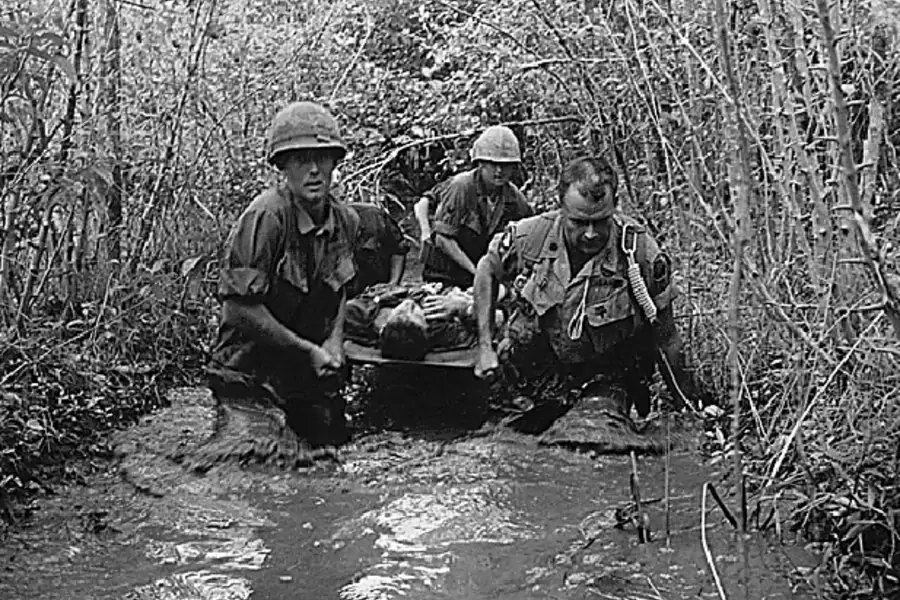Ten Vietnam War Novels to Read

All week I have been blogging on the best histories, memoirs, films, and songs to mark Sunday’s fiftieth anniversary of the arrival of the first U.S. combat troops in Vietnam. Today I want to look at the best novels, because fiction can provide fresh insights into great historical events. My challenge, though, is that I have only read three novels about Vietnam: The Quiet American (1955) by Graham Greene, The Ugly American (1958) by Eugene Burdick and William J. Lederer, and The Short-Timers (1979) by Gustav Hasford. The first two made my list of the best Cold War novels, and The Short-Timers was the grist for Stanley Kubrick’s film Full-Metal Jacket. So the list below, which is based on reviews and recommendations, are the ten Vietnam War novels that I most want to read if I can find the time to read anything other than email.
Josiah Bunting, The Lionheads (1972). Bunting joined the U.S. Army in 1966 after completing his Rhodes Scholarship. During his service in Vietnam, he saw things he disliked. The result was The Lionheads, a biting assessment of the challenge that soldiers face when they disagree with their orders. Time called it one of the ten best novels of 1972.
More on:
Larry Heinemann, Paco’s Story (1986). After miraculously surviving a brutal attack in Vietnam that kills everyone else in his company, Paco Sullivan returns to the United States. He discovers that resuming a normal life is difficult, if not impossible. Paco’s Story won the 1987 National Book Award for Fiction.
Duong Thu Huong, A Novel Without a Name (1995). (Translated by Phan Huy Duong and Nina McPherson.) Huong fought against both the United States and China. In A Novel Without a Name, she tells the story of a young platoon commander whose initial unquestioning patriotism has after ten years of war given way to doubt and regret. Huong was booted from the Vietnamese Communist Party for her writings, and A Novel Without a Name is banned in Vietnam.
Karl Marlantes, Matterhorn: A Novel of the Vietnam War (2009). In 1968, Marlantes put his Rhodes Scholarship on hold to enlist in the U.S. Marine Corp, so he writes from experience. A group of Marines fight their way through the jungles of Vietnam, looking to take and then retake an outpost at the top of a steep mountain. They discover that the North Vietnamese are not their only enemy. Don’t expect to get through Matterhorn quickly. It runs 600 pages.
Bao Ninh, The Sorrow of War: A Novel of North Vietnam (1993). (Translated by Phan Thanh Hao.) Ninh, a North Vietnamese veteran, telegraphs the theme of his novel in the title. The war has ended and the protagonist, Kien, is part of a detail that recovers the bodies of dead soldiers. The task triggers a flood of bad memories as the tale skips between past and present. The Vietnamese Communist Party banned the book because of its unflattering recitation of the war’s brutality. Western critics have likened it to Erich Maria Remarque’s All Quiet on the Western Front. High praise indeed.
Tim O’Brien, Going After Cacciato (1978). A soldier in Vietnam abandons his post to walk to Paris to attend the peace talks. His commander goes after him in what becomes a surreal journey. The New York Times’s reviewer wrote: "To call Going After Cacciato a novel about war is like calling Moby-Dick a novel about whales.” The novel won the 1979 National Book Award for Fiction.
More on:
Tim O’Brien, The Things They Carried (1990). O’Brien draws on his own war experiences in this collection of inter-linked short stories that the New York Times Book Review said belonged on “the short list of essential fiction about Vietnam.” The Things They Carried won the Prix du Meilleur Livre Etranger and was a finalist for the Pulitzer Prize.
Tatjana Solis, The Lotus Eaters (2010). Helen Adams has made her career in Vietnam in the male-dominated world of photojournalism. She has come to love the country, the war, and two very different men. Janet Maslin of the New York Times called The Lotus Eaters “a dazzling debut novel . . . . mesmerizing.”
Robert Stone, Dog Soldiers (1974). A journalist in Vietnam hopes to profit from a drug deal, but things don’t go according to plan. Dog Soldiers won the 1975 National Book Award for Fiction, the first Vietnam War novel to do so. But it wasn’t the last.
James Webb, Fields of Fire (1978). Three soldiers from very different backgrounds find that the trials of war bring them together in ways they thought impossible. Webb, as you probably know, went on to write a few other books and still find the time to become a U.S. senator. If the rumors prove true and he runs for president in 2016, Fields of Fire may become required reading for the press corps
If you have suggestions for other Vietnam War novels that I should put on my reading list, please add them in the comments below.
For more suggested resources on the Vietnam War, check out the other posts in this series:
 Online Store
Online Store